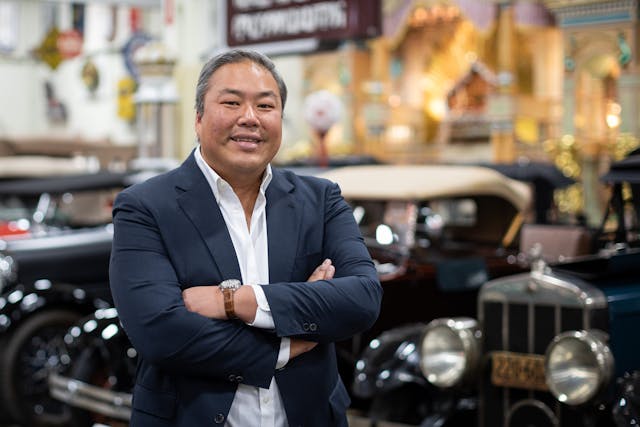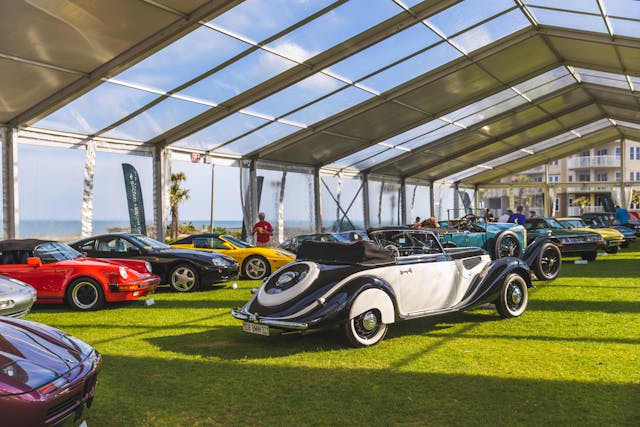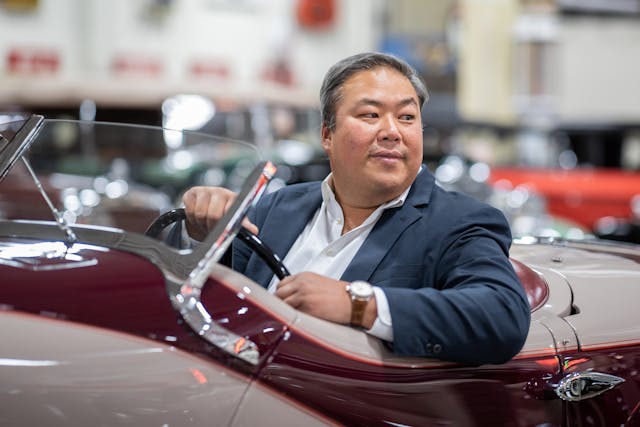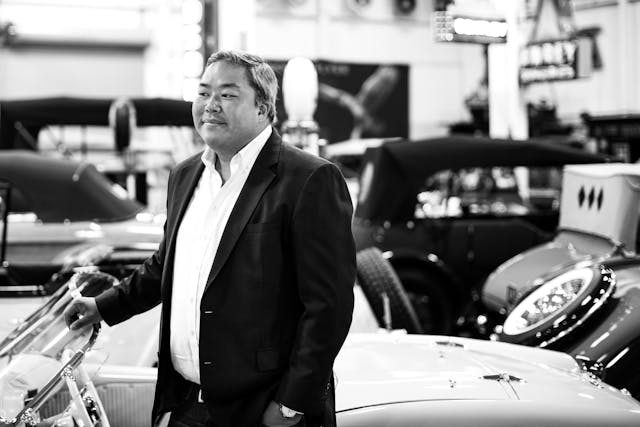The Relationship Builder: Ken Ahn and Broad Arrow Auctions
A conversation with Ken Ahn, the man behind Broad Arrow Auctions and the new Hagerty Marketplace.
Ken Ahn is President of Hagerty Marketplace, which includes the company’s new digital auctions and classifieds businesses, and he is also President of the Broad Arrow Group, a company that produces live auctions, facilitates private sales, and provides collectible-car financing. Before joining Hagerty, Ahn was President of RM Sotheby’s, SVP of Strategy and Corporate Development at Sotheby’s, and worked in investment banking at Goldman Sachs. He has an MBA from Harvard, lives near Detroit, and is building a new team to help car enthusiasts find their dream car. We spoke with Ahn the week before his company’s first Amelia Island auction.
*
HAGERTY MEDIA: You are approximately a year into starting an entirely new live auction business called Broad Arrow Auctions. What have you learned in that year and what didn’t you see coming?
Ken Ahn: First, relationships matter. We started a brand-new company with our first-ever auction in August 2022 and sold nearly $90 million of cars over three auctions in 2022, a fantastic result. That can largely be attributed to the deep and long-standing relationships our team has with collectors. For our first auction, held during car week at Monterey, Bill Fleischman trusted us to sell almost all his collection of cars, many without reserve, because he believed in us. This is a relationship-based business, and trust and relationships really matter.

I think many collectors, who are business leaders themselves, understand what we’re trying to do, which is to create marketplaces with greater transparency, integrity, and fairness. Jim Taylor is another great friend of one of our specialists, Donnie Gould, and he was extremely supportive in our new venture, choosing us to sell more than 110 cars, all of them except one without reserve. We held an auction in his hometown of Gloversville, NY. Our first year exceeded expectations and we’re grateful for all the car lovers and clients who believed in us and supported us.
HM: So back up please. Does the world need another auction house?
KA: Let me start by saying we didn’t believe the world needed yet another auction house. But we believed the world needed a different type of auction house—an auction house with high ethics that truly caters to both sides of the marketplace. Let me explain what I mean by that.
Auction houses fulfill two roles. First, you are acting as an agent to the car seller. As the agent, you have an obligation to advise your client and yield the best results possible. Both the seller and auction house benefit from a higher sale price, which is no different than, for example, a selling agent for your house. But the auction business is a two-sided marketplace. While your incentives are aligned with the seller to sell the car, at the highest price possible, there’s also an obligation for both the seller and their agent to represent the cars very clearly and honestly to buyers. You’d be amazed how often that critical piece is knowingly missed. In essence, you must help both sides of the transaction.
At Broad Arrow, we believe that there’s an obligation to provide a fair and honest bidding process as well. Buyers deserve to be treated fairly and be able to bid with confidence, without some phantom auction house bid trying to “bump the bid” above the reserve, or even worse, when there is no reserve. That’s why he decided to work with Lydia Fenet, a seasoned auctioneer who spent decades at Christies, and who is not tainted by some of the bad practices seen in the car auction world. Auctions used to be “buyer beware,” but we’re out to change that.
HM: So, you believe there’s an opportunity for an auction company that explicitly says it is going to take the high road for both the sellers and buyers?
KA: Yes. While we may give up a consignment here or a sale there because we’re not willing to compromise those values, we believe that over time the reputation we’re building will be a major differentiating factor for Broad Arrow. We are willing to give up short-term gains because we’re in this for the long haul. Our reputation is everything and that stance has helped us attract talented people. Now, nothing is perfect and there is subjectivity to many parts of our business, so I’ve told our crew to use a simple maxim: Did we do the right thing to the best of our abilities? Did we admit and fix mistakes?
One thing I learned in my career was that the businesses that cultivated their brand and reputation—and ultimately trust—had a much greater success rate. As Warren Buffet said, “It takes 20 years to build a great business and brand and reputation and 5 minutes to ruin it.” I wholeheartedly believe that.
HM: In the first 12 months of operation, you’ve held four live auctions. How many will you do in 2023 and perhaps a better question is, how many would you like to do?

KA: We’ve held three auctions since August 2022, and The Amelia Concours d’Elegance will be our fourth auction. (After the interview, Broad Arrow achieved total sales of more than $31 million with 81% sell-through at The Amelia). We will host at least three more live auctions in 2023, including The Porsche 75th Anniversary Auction at the Porsche Experience Center Atlanta in June, our Monterey Jet Center Auction in August, and another auction before the end of the year.
Outside of auctions, we have also been busy with private sales and collector car financing. In 2022, we sold more than 70 cars privately with an average value of more than $1 million, and we now have a loan book of more than $35 million and are growing rapidly.
HM: Soon after you started Broad Arrow, the company was acquired by Hagerty. Has the merger compromised your independence and or added bureaucracy?
KA: We knew that Hagerty’s values—care for the clients and integrity—aligned perfectly with our ethos. On the other hand, we were concerned with the different operational needs and fast-changing, fast decision-making nature of a start-up. But it soon became clear to us that Hagerty, led by McKeel Hagerty, is a highly entrepreneurial, growth-minded company that was also willing to give us enormous autonomy.
Hagerty’s brand is built on not only the love of cars, but trust, right? Insurance is the ultimate trust business. At the end of the day, you’re selling a totally intangible service, which is literally a promise on a piece of paper that says, “you pay me money for the next 12 months and if something happens to you, I promise you that I’ve got your back.”
We wanted to partner with a company that’s built on trust, and I think Hagerty recognized that we would add to that reputation while enabling the company to enter the business of helping its members buy and sell cars enjoyably and safely. We got engaged quickly, and then within eight months of engagement, we got married, so to speak. Hagerty made the initial investment in Broad Arrow in January 2022, followed by a full acquisition in August 2022.

HM: In addition to running Broad Arrow, you’re also in charge of Hagerty Marketplace, a digital car shopping site that started by offering free classified listings to Hagerty Drivers Club Members and added digital auctions in late 2022. There are so many digital auctions out there, from eBay, to Bring a Trailer, to Cars & Bids and it seems like a new one every month. How does Hagerty Marketplace differentiate itself?
KA: First, we’re the only one—as far as we know—that’s integrating 1) live auctions; 2) private sales; and 3) digital auctions at scale. While each has distinctly different business models, they are all just different ways of buying and selling cars.
Simultaneously starting and running those three different businesses under one roof with a cohesive strategy is very difficult, which is why it’s not been done before. But if you have the right team, the platform, the capital, and the audience, you can create an integrated offering under the same high-trust ethos. That’s what we’re doing here at Hagerty.
HM: Can you be more specific? For example, other than bidding online versus, for example, live, and having cars presented on websites versus at venues, how are the businesses really that different?
KA: I would argue that an online auction as we know it today is not a “true” auction business because there is really no accountable intermediary. To me, it’s really a classified listing service with an auction pricing mechanism attached to it. Once the digital auction is over, the platform automatically charges a fee to the buyer’s credit card, hands over contact information for buyer and seller, and they are done—they step out. Adios! Sayonara!
At that point, it’s no different than buying a car through a newspaper classified or publication from a stranger, hundreds or thousands of miles away, and it’s up to the buyer and seller to work out the details. Since most of the time the transactions are not local, you exchange a smartphone photo of the title, you wire five, six, even seven-figure sums of money, most of the time without ever laying eyes on the car or the title and cross your fingers that the seller will come through. That’s a scary process. If the parties live far apart, who blinks first? Does the seller wait for the money to arrive in an account before sending the title? Of course, no seller wants to sign off the title and ship the car without the money hitting the bank account first. But what if the car was massively misrepresented?
At best, an online auction might refund the buyer’s premium but will tell you “We don’t want to profit from your misfortune, so here’s your buyer’s premium back, but it’s really up to you and the seller to sort it out.” Ask me how I know.
We are taking a different approach with Hagerty’s digital auctions, and we are facilitating the transaction as a licensed dealer, just like live auction houses. We are verifying the identity of buyers and sellers, we’re getting the title in our hands or confirmed the seller is a licensed dealer who must, under law, deliver a clear title upon transaction closing, before the auction goes live. Moreover, we collect the payment from buyers as a trusted intermediary, and we don’t release them until all docs and title transfers are signed by the seller. We are committed to building a two-sided marketplace with the goal of providing a fair and safe way for car lovers to buy and sell cars.
HM: That sounds like a lot of work.
KA: It is, but that’s what Hagerty is about, finding ways to better serve the car community. When someone wants to auction a car via the digital auction, we send them a FedEx envelope and they send us back the title, pre-paid. The buyer knows that the paperwork is in order before bidding. For the seller, we verify the bidders. Once the auction is over, the buyer wires us the money so he or she doesn’t have to worry about where the money is going. Then we tell the seller, “Okay, we have the money, release the car.” Then when the car is delivered to the buyer or the car is picked up, we release the money to the seller. We stand behind the transaction.
HM: Again, that sounds like a lot of work.
KA: Keep in mind that companies like Manheim auctions, the service used by dealers for newer cars, does tens of thousands of cars exactly this way every single year. So, it is high touch, but not if you have the right resources.
HM: Are you fixing a problem that doesn’t exist? I’ve bought and sold half a dozen cars on Bring a Trailer and haven’t had a problem. Are failed transactions becoming more of a problem or are you trying to justify higher fees?
KA: I presume you wear a seatbelt when you’re in a car. When’s the last time you really needed it? You can’t remember, right?
Even if the chances that you will need that seatbelt are low, the consequences of not having the belt when it is needed are damn high, maybe even fatal. You’ve been lucky with your buying and selling but I hear plenty of horror stories—and have experienced it personally, more than once.
Let’s think about this another way: For the person who might buy or sell a car once every few years, it’s worth making sure that nothing goes wrong. Imagine you save up for years to buy a car. You want to reward that discipline with the dream machine and a great experience. We want to help people transact in a way that everyone is protected.
HM: Yeah, it is pretty scary to wire 40 grand to a stranger.
KA: Exactly. Those horror stories happened to me three different times. The first car I ever bought on an online auction platform was an E39 M5, and the engine compartment literally blew up within 10 minutes of the car being offloaded from the trailer. When I contacted the auction platform, they kindly refunded my buyer’s premium of $912.50, then told me I was on my own to figure it out with the seller. The seller told me the BMW was as-is, where-is, so go pound sand. It cost me $8,500 to fix it. Emotionally, I couldn’t keep that car—it was supposed to be fun. I bought a different car online, signed the bill of sale, then wired the funds like any good buyer should do. The seller in Southern California Googled my name, figured out who I was, then called me to say he made a mistake in describing the car, apologized, and simply just wired my money back. That’s before even shipping the car or me looking at it. True story. But what if the buyer was John Doe and not known in the industry?
HM: Are you also going to stand behind the advertised condition?
KA: There are obvious limitations to that and in many cases, we do have to rely on the seller. We don’t have all the histories of every car, and we can’t test drive every one of them, though we endeavor to have our team of specialists inspect the cars wherever we can. But we work with the seller to represent the car as accurately as we can based on history files, documentation, etc. If we misrepresented the car, we would stand behind it. If the seller misrepresented the car, we work on behalf of the buyer to find an amicable solution for the buyer, ranging from remediation and fixes to unwinding the transaction. Also, in the not-so-distant future, we’ll offer service contracts for the cars we have inspected or know, for further protection for the buyers.
HM: It’s been about three months since you launched digital auctions. How’s it going?
KA: It’s going well, although it might not appear that way for first-time visitors. We are deliberately taking baby steps as we refine the software and operational processes. We have a list of dozens of site features that we’re rolling out every two weeks and while it may not be obvious, we’re learning a lot with respect to people’s behavior and making tweaks to optimize their experience. Once you open the floodgate, it’s difficult to change a lot of those features as we go, so we’re flying under the radar a little bit. What we’re seeing so far is really encouraging.
HM: What’s that?
KA: We’ve attracted nearly the same number of views and engagement that best platforms achieve for auction lots. And those eyeballs converted to bids as proven by a Dodge Viper and Porsche 911 Turbo recently that both brought strong prices. We are also seeing increased engagements, comments, and a community that is starting to form. So far so good. As we get our process and platform kinks ironed out, we’ll focus on increasing the supply of cars.
HM: Did we miss anything?
KA: I’d like to thank so many for their support and just say that we’re working very hard to bring a new, safer tool to the enthusiast community.



